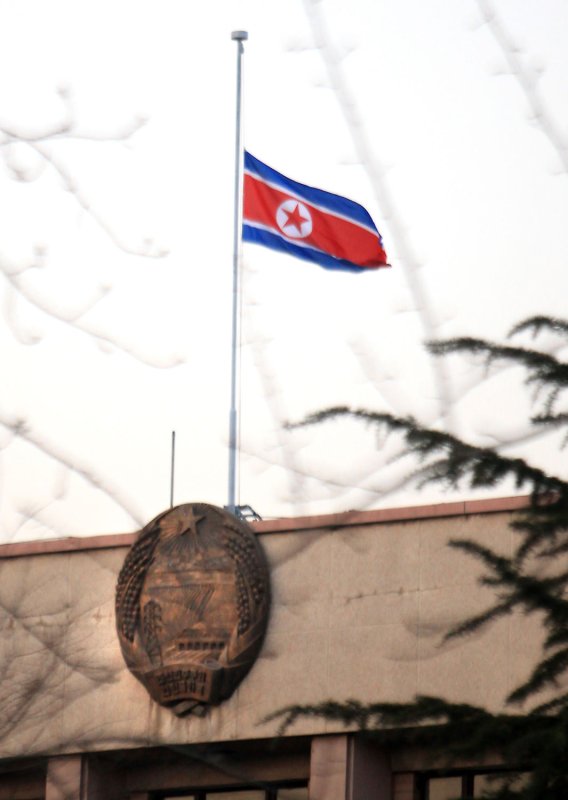1 of 3 | The North Korean flag flies at half-mast over its embassy in Beijing December 19, 2011. China on Monday offered its "deep condolences" on the death of North Korean leader Kim Jong-Il, which analysts said will spur China's leaders to boost ties with Pyongyang to prevent instability. UPI/Stephen Shaver |
License Photo
PYONGYANG, North Korea, Dec. 19 (UPI) -- North Korean leader Kim Jong Il, who died during the weekend, was called "Dear Leader" in his isolated communist country, but outside it was seen as a dictator.
Kim, who came to power in 1994 after the death of his father and national founder Kim Il Sung, died "from great mental and physical strain," during a train trip on "a field guidance tour," the state Korean Central News Agency said.
"He will be remembered as a person who was responsible for awful things: for the existence of one of the worst dictatorships in not only Korean history but the world history at least in the 20th and 21st centuries," Andre Lankov, a Korean history author, told CNN.
"Yet he did not create this dictatorship -- it was his father's but he took responsibility, and he made sure it continued for many more years."
During his rule, Kim made North Korea both an isolated and a nuclear-armed country which brought tough international sanctions.
Within the country, Kim's personality cult was deeply rooted and he was well regarded, the U.S. news network said.
"He's a mysterious person -- I think by design," Han S. Park, director of the Center for the Study of Global Issues at the University of Georgia, told CNN. "Mystery is a source of leverage and power. It's maintaining uncertainty."
His father, Kim Il Sung, became leader after the Japanese surrender in World War II.
Kim Jong Il's younger brother drowned as a child and his mother died when he was 7 years old.
As the first-born son of an iron-fisted dictator, "the doors were likely opening for him from a very young age," Dae-sook Suh, political science profession at the University of Hawaii, said. Kim Jong Il was designated as successor to Kim Il Sung in 1980.
"It's a peculiar government to say the least," Dae-sook Suh said. "He honors the legacy of his father, but the new government is a Kim Jong Il government. It's quite different from his father's."
During his rule, Kim enjoyed all finer things of life even though starvation, brought on by the collapse of the Soviet Union in the early 1990s and devastating floods, was widespread in the country, CNN said.
Kim also continued with his nuclear weapons program. In 2003, North Korea withdrew from the nuclear non-proliferation treaty and three years later, it conducted its first nuclear test.















